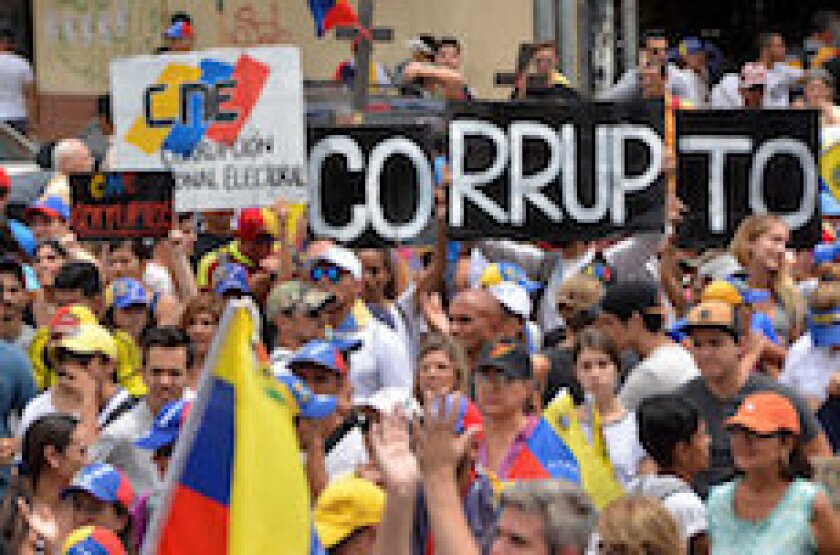Goldman Sachs’s $2.8bn purchase in May may qualify in that latter category, although the bank denies it has done anything untoward.
The US firm bought 93% of a PDVSA (the state oil and gas company) bond issued in 2014 at 31 cents on the dollar. Nomura is also said to have waded in for $100m in similar fashion.
Although Goldman asserts it bought the asset from a broker in the secondary market, it is widely believed that the brokerage acted as an intermediary for the Venezuelan central bank.
Immediately after the deal was sold, the central bank’s international reserves jumped.
Venezuela has a track record of issuing bonds, retaining them through the central bank and selling them later, providing funds at a time when it would be unthinkable for the country to return to capital markets.
The US bank’s involvement in the trade led to protests outside the its offices in London and New York and accusations it was propping up a political regime under president Nicolas Maduro accused of human rights abuses.
The deal offered Goldman Sachs Asset Management a sensational yield of over 40%. It will also give whoever ends up holding the bonds a seat at the restructuring table if Venezuela does default.
Indeed, given that the bonds were quite possibly sold without any original issue discount clause in the documentation, the holders them would possibly be able to reject any restructuring deal and litigate to force Venezuela to repay at par, it is said.
However, given that the Venezuelan opposition parties have vowed not to honour the bond, saying it was issued illegally, what bondholders will get back in due course appears not to be a foregone conclusion.
Whether or not Venezuela defaults or negotiates a manageable restructuring package, one thing is certain: if the country is to recover, it must do so without Maduro. Financing his regime, giving him the wiggle room to prolong his reign, is unconscionable.
But even holding secondary market paper is fraught with moral hazard. The Venezuelan government has been just barely avoiding default for months. Its economy has been crippled by hyperinflation and Maduro has caused a humanitarian crisis by electing to continue servicing the country’s debt at the expense of imports of food and medicine.
The resultant civil unrest has claimed 67 lives, according to the Venezuelan prosecutor’s office.
Many investors are likely holding Venezuelan paper with the hope that Maduro will soon be replaced and that Venezuela will get back on its feet. If Venezuela were to escape from its crippling debt burden, it could recover swiftly. The country is endowed with incredible resource wealth (particularly oil) and, without the dysfunctional policies of Maduro and his predecessor, Hugo Chavez, could flourish. It is important to remember that Venezuela’s debt burden is a symptom of its economic mismanagement; not a sign of economic unviability.
The country’s presence in emerging market bond indices means that many investors hold Venezuelan assets as part of a portfolio. Indeed, Venezuela, though it accounts for only 5% of JP Morgan’s Emerging Market Bond Index, provides 20% of the yield.
But because bondholders’ priority is for the state to service its debt rather than to protect its citizens, they are instantly plunged into a moral grey area. If that was not their priority, they would be at perfect liberty to donate their bonds to Venezuela to be cancelled; one of the few moves that can actually help Venezuela.
Ricardo Hausmann, director of the Centre for International Development wrote in May that JP Morgan should exclude Venezuela from its index and introduce a “decent emerging markets index” in which money is invested in “only countries adhering to minimal standards of respect for their citizens”, allowing investors to deploy money more ethically.
The idea does have some merit. Since investors in Venezuelan bonds are hoping their coupons will be paid even at the expense of food and medicine for the country's citizens, they are in a morally uncomfortable position. But that argument is only valid if one accepts that default would be a less painful option for Venezuela’s citizens than continuing to service the debt.
Maduro has demonstrated that he will do anything in his power to avoid a default. And, though the consequences of this determination have been horrendous, there is a rationale to this decision.
Bonds issued by PDVSA (and at least two of Venezuela’s sovereign bonds) do not have collective action clauses. This means that, as Argentina found out to its cost, a few investors can hold out, rejecting restructuring deals and push for repayment at par. Such a repayment might allow investors to seize Venezuela’s oil assets and hamstring its recovery.
If default is a worse option for Venezuelan citizens than continuing to service the debt, then Hausmann’s argument is simply 'one should not invest in morally suspect regimes.' This idea might have some weight but would hardly be specific to Venezuela.
Such a rule could be equally applied to core markets indices. Perhaps a 'decent' core markets index could leave out states which abuse human rights, sell weapons to terrorist groups or ignore environmental treaties, etc.
The situation is complex. Perhaps default is Venezuela’s best way out of its difficulties. Perhaps it could, without Maduro, get its economy on track without having to restructure.
Either way, holding Venezuelan debt, and the fantastic yields it offers, comes with uncomfortable moral baggage.

